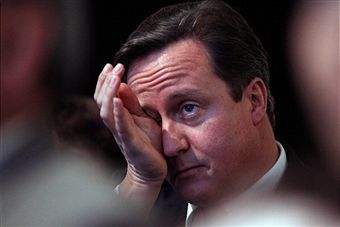 The abiding image of this conference may be the sight of Steve Hilton apparently
shepherding the turbulent Andrew Tyrie into a booth, from which Tyrie emerged singing George Osborne’s praises. “A huge step forward…you can some
consistencies,” he said, which was an endorsement of sorts. What did everyone else make of it? As you can see, David Cameron looked morose at times, but the mood in the hall oscillated
between sobriety and quiet optimism, matching Osborne’s blend of austerity and promise for the future. Fleet Street is similarly conflicted: no paper gives him an unqualified endorsement, but no
paper entirely rubbishes him either.
The abiding image of this conference may be the sight of Steve Hilton apparently
shepherding the turbulent Andrew Tyrie into a booth, from which Tyrie emerged singing George Osborne’s praises. “A huge step forward…you can some
consistencies,” he said, which was an endorsement of sorts. What did everyone else make of it? As you can see, David Cameron looked morose at times, but the mood in the hall oscillated
between sobriety and quiet optimism, matching Osborne’s blend of austerity and promise for the future. Fleet Street is similarly conflicted: no paper gives him an unqualified endorsement, but no
paper entirely rubbishes him either.
The Times concludes (£), as Tyrie did on Saturday, that Osborne is strong on austerity and weaker on growth. “What is missing, though, is a vision for Britain’s economic future. If Mr Osborne wants to preside over something more than his country’s relative decline in the world, the re-engineering of Britain will require more than piecemeal support for scientific enterprise. There is an opportunity now to reshape the landscape of the British economy.”
The Guardian is, obviously, tepid about fiscal conservatism, but its economics editor, Larry Elliott, is intrigued by credit easing. He says it is “a tacit acceptance that monetary policy is not working”. Elliott argues that CE and a further round of QE are designed to “compensate for the Treasury’s fiscal austerity”. He worries, though, that those measures will not address the “real problem in the economy”: the squeeze on real incomes. In fact, they may deepen that crisis by ramping up inflation.
The Independent is generally positive about what it terms “Osborne’s delicate balancing act” of mixing gloom with cautious optimism. But economics gurus David Prosser and Sean O’Grady say the chancellor might have gone much further. They suggest he might have increased capital investment and announced changes to capital gains relief on principal residential homes to divert funds into industry. Osborne has more to do on growth, the paper surmises.
The FT’s Matthew Engel is the least impressed of Fleet Street’s commentators. He concedes that Osborne’s “speech felt like a triumph”, but laments that its content was “tawdry”. His criticism verges on incandescence at times: “If the government has a plan to save the country from recession, no one seems able to explain it coherently, including Mr Osborne… (whose) self-confidence shades into smugness, and we have all become wary of smug chancellors”.
Today, Osborne will travel to the European finance ministers’ summit in Luxembourg to discuss the fate of the Euro, which is, of course, linked with his own — and ours.






Comments